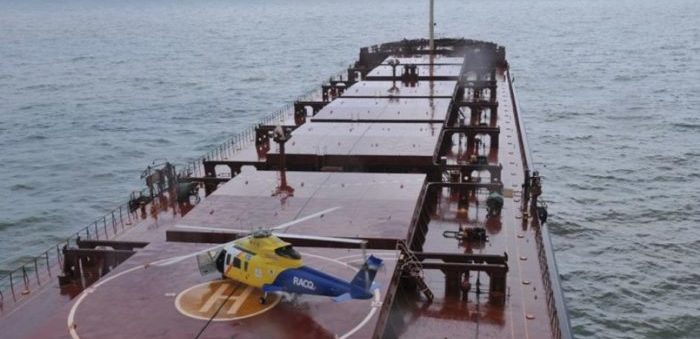Helicopter operations are commonly used on ships for crew changes, Pilot transfer (embarkation and disembarkation), emergency situations as MEDEVAC (medical evacuation) and/or rescue. They are considered to be complicated high risk operations, as they involve personnel / equipment and crafts other than vessel’s and they demand accuracy, training and clearly established procedures. The officers and crew members associated on scene for these operations should show high level of situational awareness and good seamanship.
When it comes to these challenging operations, the following issues are of outmost importance:
#1 Procedures
The vessels’ operators/ ship owners and all other stakeholders involved in shipping management have to develop (or incorporate) procedures in their Managing Systems related to helicopter ship operations. This means that every vessel should be able to respond to the requirements of the ICS Guide related to Helicopter operations. Procedures may include step by step guidance, checklists, reports, standard communication expressions and any other supportive information related to helicopter operations.
#2 Safety precautions
Helicopter operations must not be permitted over the tank deck unless all other operations have been suspended and all cargo tank openings closed. On a vessel which does not have a dedicated winching area, it would be necessary to provide an area suitable for use as an emergency winching area. The area should as minimum and possible be free of turbulence, unaffected by flue gases, readily accessible and clear of accommodation spaces, with a clear flight path along the ship’s side, capable of being illuminated by downward facing floodlights, without obstructions such as masts and with all moving parts secured.
#3 Equipment
Ocean going vessels, in accordance with SOLAS chapter II, have to be equipped with extra firefighting equipment dedicated to Helicopter operations, in conjunction with lifesaving or operational equipment. Crew should never compromise on wearing proper PPE and of staying clear from the area of operation. Landing or winching areas should be as appropriate established and maintained in order safe operations to be conducted.
#4 Communication
It is vital for these operations, that a good communication path has been established between helicopter and vessel’s bridge team throughout the operation. All available information should be passed to helicopter’s pilot and vice versa. The Course to be steered and the Speed to be maintained by the ship during the operation, the intended position of operation, the ETA to that position, the desired Landing or Winching Area and current weather conditions are the most important information to be passed to the pilot of helicopter.
#5 Weather Forecast/Conditions
Weather plays a crucial role to these operations. Vessel should review the weather forecast and especially wind speed and direction; visibility; sky condition; rain, fog, drizzle and snow conditions and sea state. All relevant information should be passed to Helicopter Providing Service Company and/or to the Helicopter itself.
[/two_third_last]
#6 Training & Familiarization
A sufficient number of crew members should be trained in helicopter operations. Roles and responsibilities should be clearly mentioned in Muster list and drills to be contacted in appropriate intervals with the use of relevant equipment. A safety check-list should be used as the basis either for training or preparing the ship/helicopter operations. Another point of training for crew is the evacuation of the vessel with helicopter’s assistance as there are a lot of examples where such rescues and evacuations took place.
Ship’s crew members involved in helicopter/ship operations should be trained in accordance with standards and procedures necessary to maintain the safety of the ship, its crew and the helicopter aircrew. It must be ensured that the Deck Party Officer and the Deck Party Crew are fully familiar with equipment for winching and landing operations and are trained and regularly drilled in the tasks required of them in both routine operations and emergencies.
#7 Contingency planning
A contingency plan should be devised to minimize the effect of a helicopter crashing onto the ship/or in the sea nearby and seafarers should be trained in the operation of the plan. Fire party, rescue party, readiness of means for recovery from water, are some of key factors that should be addressed in a proper contingency plan. Preparedness of ship’s crew to perform safe and short time landing and/or hoisting to and from the vessel is important thus a helicopter is more vulnerable to many threatening factors.
The least amount of time spent in approach and hover/landing to accomplish the mission safely, greatly increases the odds of the mission being completed successfully, with no injuries or damage sustained on behalf of vessel or helicopter.
#8 Roles and Responsibilities
The ship’s Master is ultimately responsible for the safety of his ship. If there is any doubt whether the proposed helicopter service meets the requirements of his shipping company concerning safety, liability, indemnity and insurance, he should seek company advice before operations commence. He may stop or curtail the operation at any time for reasons of ship safety. In this event, the helicopter must move clear of the ship immediately.
- Deck Party Officer (DPO) is the leader on scene of the deck party involved to helicopter operations. He has to ensure that firefighting, life saving and other related equipment and is ready available for use during operations, the deck party crew is fully briefed and trained to support operations and appropriate communication has been establish with bridge as appropriate.
- Deck Party Crew (DPC) involves trained crew members with duties assigned for the operation. They have to assist DPO During operations, assist the helicopter passengers where and if necessary and prepare/operate firefighting / lifesaving and other related equipment.
- Officer of the Watch (OOW), has the vessel’s con under the supervision of Master during the operation, is responsible for the safety of navigation, the weather prediction and monitoring and the appropriate radio communication with the helicopter and/or the helicopter service provider.
































































